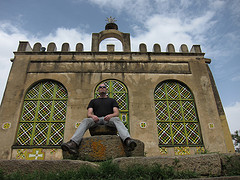I almost miss the bad old days. When I first started wandering around some of the more obscure nooks and crannies of this planet, lo these many years ago, Internet connections were rare and wonderful discoveries; now I just get annoyed when I can’t get online. The last decade-and-a-half of innovation has completely transformed the experience of travel. Right now I’m in the middle of a four-continents-in-six-weeks jaunt, from Canada to East Africa to Europe to India, and thanks to all my tech gear, life on the road is almost unrecognizably different from that of fifteen years ago.
The biggest change this trip has been my ebook reader. I have a Kobo. There is much about my Kobo that I really don’t like: its interface is clumsy and confusing; anything other than straight front-to-back reading is intensely frustrating; it can only use completely open wireless connections, so any wi-fi network with a login or click-to-agree-terms button is completely useless to me; and when I do connect, attempts to download new books fail approximately 50% of the time. But they do succeed the other 50%, meaning I’ve read nine books in the last month—and was able to buy and download books via ambient wi-fi in Kenya and Djibouti, which did feel like living in the future.
There are also subtler and more negative repercussions. I saw my own second novel for sale in a supermarket in Mombasa, and instead of the slight thrill of pride I usually get, my instinctive response was: “In paper! How quaint!” More worryingly, my e-book reader means the serendipity of finding and reading random books by new authors, because there’s nothing else to read while on the road, is dead. It’s like The Filter Bubble in miniature. But on the whole that’s a tradeoff I’m willing to make.
I still have some complaints. For instance, it’s still virtually impossible to add a stopover to an air itinerary without going to a travel agent. You can manage it directly with the Emirates and Icelandair web sites, but not with any of the aggregators. I’m very fond of Kayak, but if you have a complex many-city itinerary, their price optimization fails completely—it often works out cheaper to book all of the legs as individual one-way tickets—so I might soon defect to Hipmunk. And it irritates me that all of the various hotel-booking sites are apparently different skins on the same engine. Of them all, I prefer Booking.com, but I would like some actual competition.
And then there’s the guidebook problem. I used to be loyal to Lonely Planet (in fact, they play a major and laudable role in my debut novel) but then the BBC bought them out and watered them down. They do have a pretty good city-guide app selection, and they let you buy and download individual subsections of books, but their content isn’t as good as it used to be.
I think the future of travel guides is crowdsourced data on smartphone apps. In fact, I’ve taken a step in that direction myself: my app iTravelFree lets you download Wikitravel guides and OpenStreetMap maps to your Android or iOS device, and refer to them even while offline, to avoid roaming charges. Its 10,000-and-counting active users seem to like it, and it has come in awfully handy this trip: at one point I was hopelessly lost in Addis Ababa, until I realized I had the (surprisingly good) OpenStreetMap of the city on my phone, and my app saved the day. But while Wikitravel’s coverage of East Africa is better than I expected, it still isn’t near as thorough and detailed as its guidance for, say, Paris. It will improve over time, of course, but I still found myself flipping through my quaint paper copy of LP’s Ethiopia and Eritrea again and again.
It’s worth noting that half the tech I’m carrying is verging on obsolete, and yet I have no real desire to upgrade. I’m writing this on a three-year-old Linux netbook; my phone is a two-year-old HTC Magic running Android 2.1; my music lives on a second generation iPod touch; and the Kobo, as mentioned, isn’t exactly cutting edge. The last three devices can all charge from the three USB slots on the netbook, which means I only need one plug converter. Alas, I also have two cameras. One’s a Canon S90, which is a joy; the other is an Olympus E-PL1 Micro Four Thirds, which is mostly a royal pain, but does take great pictures. This means I also have to drag along their proprietary battery cradles. Dear camera manufacturers of the world; please enable USB charging, ideally as of yesterday.
This time next week I’ll be in India, which is something of an acid test for travel:
…so we’ll see how everything holds up there. It’ll be interesting to see how Delhi and Mumbai have transformed in the eleven and seven years, respectively, since I last saw them. I expect the answer is “a lot”; but I also suspect that, almost invisibly, iteration by iteration, the changes wrought by technology on the experience of travel have been scarcely less profound.
